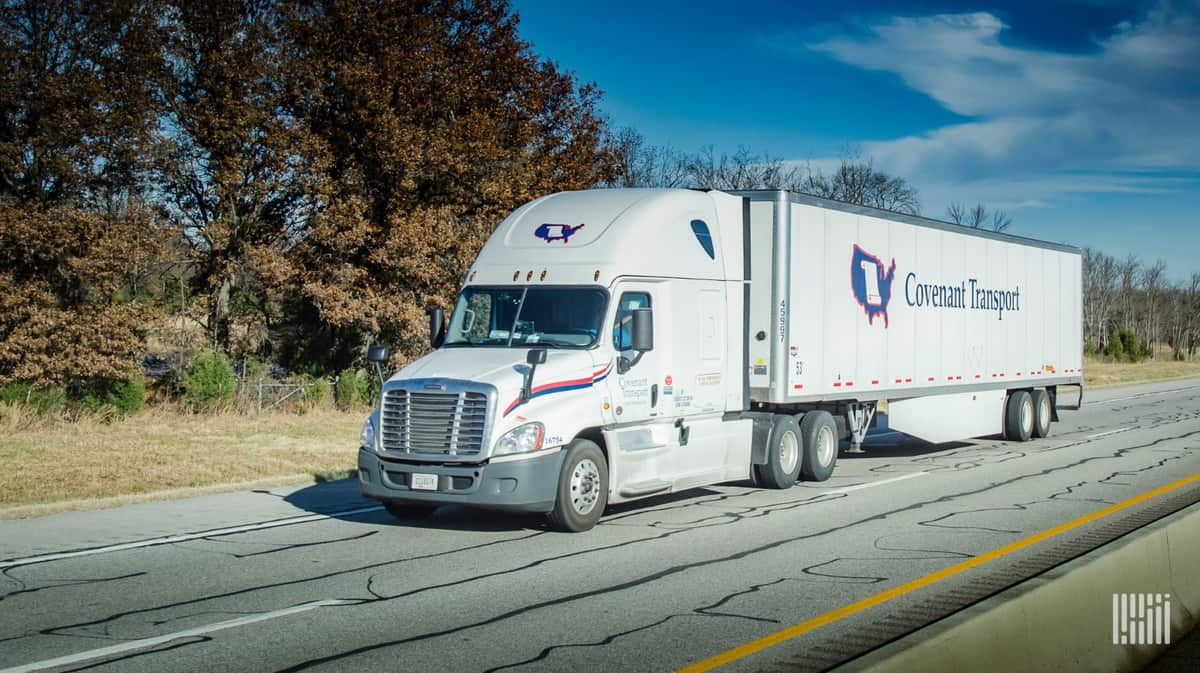Covenant Logistics is the latest truckload carrier reporting a key performance record in its first-quarter earnings report, and the company did it while driving fewer trucks.
Earnings of $1.35 per share on a non-GAAP basis were a record for any quarter, Chairman and CEO David Parker stated in Covenant’s earnings release.
Combined truckload revenue — both expedited and dedicated — rose 22.4%, climbing to $187.74 million.
But the company’s performance was not driven just by more revenue on the books. The adjusted operating ratio for Covenant’s combined truckload operations improved to 92% from 96.2% in the first quarter of 2021, with both the expedited segment (88.4% versus 91%) and dedicated segment (96% vs. 101.8%) turning in improved adjusted ORs.
The result was that on the combination of higher revenue and OR, adjusted operating income for the combined truckload operations climbed to $11.97 million for the quarter, an increase of 168%.
Average tractor mileage for the quarter increased only slightly, to 28,331 miles from 27,809. But the average revenue per tractor per week jumped to $5,204 from $4,132, an increase of 25.9%. It turned in that performance while running fewer tractors, down to a weighted average of 2,302 from 2,520.
Covenant (NASDAQ: CVLG) management has said frequently that it was shifting its focus to more profitable lanes and would focus less on growth for growth’s sake. But in the company’s prepared statement accompanying the earnings, COO Paul Bunn also cited “an extremely tight driver market” as a cause of the decline in the number of tractors on the road.
The drop in average units was 17 for expedited, and 201 in dedicated.
The increase in operating and net income also came despite an increase in costs. Bunn, in his statement, said the average truckload operating cost per mile was up 56 cents on a GAAP basis.
Salaries, wages and related expenses at Covenant were up 15.4% year-on-year. Covenant also saw a significant increase in equipment rentals and purchased transportation, with that expense rising to $83.6 million for the quarter, a whopping increase of more than 46% compared to the first quarter of 2021.
“We expect cost pressure to persist even if freight demand moderates,” Parker said in the statement. “From wages and insurance, to equipment and parts, to fuel prices and interest rates, the cost of our business is increasing.”
The end result was an increase in operating income to $23.84 million, up 126% from the year-earlier period, while net income roughly doubled to $22.16 million.
Covenant’s Managed Freight segment — its brokerage arm — also had an improved quarter. Its operating income more than doubled, to exceed $10.8 million, while its OR climbed to 87.4% from 90.5%. In its prepared statement, Covenant said the brokerage arm profited from “executing various spot rate opportunities and handling overflow freight from both Expedited and Dedicated truckload operations.”
The warehousing segment at Covenant was the only part of the business with a deteriorated OR. The adjusted OR for warehousing came in at 92.5%, compared to 90% from a year earlier, and adjusted operating income fell to $1.3 million from $1.5 million. Labor costs were cited as a headwind.
Much of the big news at Covenant in the quarter was outside the normal profit/loss statement. It began paying its first-ever dividend, it acquired hazmat carrier AAT Carriers (which like Covenant is based in Chattanooga, Tennessee), and it bought back roughly 655,000 of its shares in the quarter, continuing with 429,000 more share purchases this quarter.
Those purchases in the current quarter come as Covenant is getting hit by the weak market for truckload stocks that has affected other carriers. Covenant’s stock is down 18.19% in the past month, according to Barchart, and is down 13% for the past 52 weeks. Covenant’s stock was up roughly 44% for full-year 2021.
Parker’s outlook remained bullish but was somewhat tempered: He said Covenant anticipates a strong freight market “for at least the first half of 2022,” without making that claim for the balance of the year.
“During this period, we expect a continuation of significant increases in pricing and operating costs, and we expect to continue to improve the margin expectation in certain Dedicated contracts and the duration of fleet commitments in certain Expedited contracts.”
His outlook for the second half of 2022 was “more balanced, as supply chains gain fluidity, economic growth potentially slows, and consumer spending on services rebounds.”
Covenant is holding its investor call Thursday at 10 a.m. ET.
More articles by John Kingston
$70k for a part-time driver? Covenant CEO says that could be fine for some
2 big shippers defend the annual bid round in selecting carriers
Three-person office of the CEO to run Covenant, but Parker retains post










